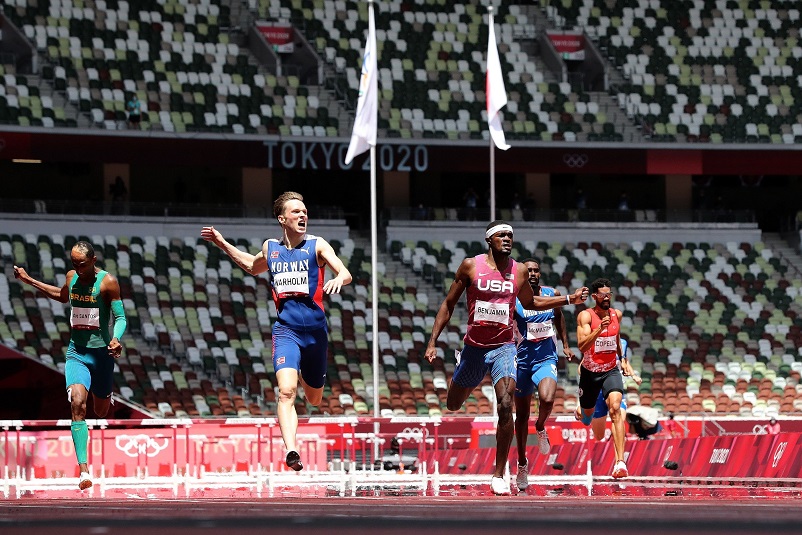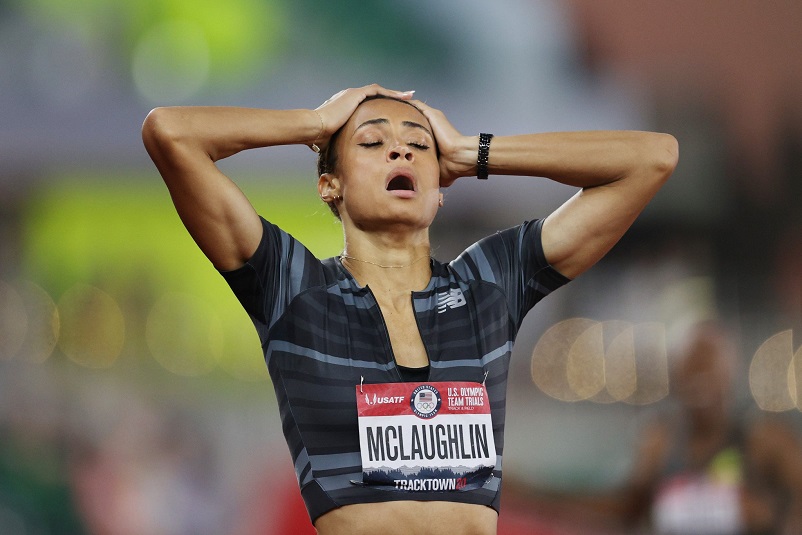 It was 24 hours that shook up the athletics world. Two races, taking a cumulative 97 seconds, that will forever be etched into the sport’s memory.
It was 24 hours that shook up the athletics world. Two races, taking a cumulative 97 seconds, that will forever be etched into the sport’s memory.
For decades to come, they’ll talk of this week’s Olympic 400m hurdles finals as events that changed everything we thought we knew about the limits of human performance. First there was the men’s race and that magnificent, mind-altering moment when Karsten Warholm crossed the finish line and the digits on the clock, somehow, read 45.95.
His time was 0.76 seconds faster than anyone had ever run, and 0.84 faster than anyone not named Warholm. Not so much one small step for man as one giant leap towards a new era in the event they call the man-killer.
The adrenaline had barely stopped flowing for athletics fans when, the very next morning, along came a trio of generational talents for the women’s 400m hurdles final. Sydney McLaughlin led them home in 51.46, 0.44 quicker than the world record, and 0.70 quicker than anyone not named McLaughlin had ever run.
A couple of hours later, the US 21-year-old sat in front of a room of journalists and tried to explain what it meant to have helped her event progress with such a quantum leap.
“It’s not one of the hot events people would usually watch,” she said. “But it’s definitely been made something interesting. Every time we step on the track, there’s some record being broken and it’s exciting to be a part of that and push the boundaries.”
Muhammad, a decade older than McLaughlin at 31, knew exactly what she was talking about.
“It hasn’t always been that way,” she said. “I’ve been part of it on the journey from the event no one watched to the event everybody wants to watch and being the main event. I’m proud to be part of that.”
A day before, Rai Benjamin had neatly captured the mood after producing what was likely the best performance in athletics history that was not rewarded with victory, clocking 46.17.
“It’s insane,” he said. “All of us came out and tore it to pieces. Now we’re in a different stratosphere.”
Warholm was asked shortly after his race whether he’d just been part of the greatest race in history.
“Your words, not mine,” he said. “But I think it’s up there. I hope it will be.”
Listening to the four over the past couple of days, along with bronze medallists Alison dos Santos (who set a South American record of 46.72) and Femke Bol (who set a European record of 52.03), it was clear we are living through the definitive golden era of the 400m hurdles.
This captivating crop of talent has pushed the boundaries into a previously unthinkable place, and while there’s no doubt improved track and spike technology could have played a part, the way in which these athletes have demarcated their discipline from other events at the Games – events where such breakthroughs have not occurred – means the chief explanation is very straightforward: this is a generation of genuine all-time greats.
Since Muhammad and McLaughlin began their assaults on Yuliya Pechonkina’s world record of 52.34, set in 2003, they have taken a total of 0.88 off the mark, reducing it by 1.29%.
With his pair of world records this summer, Warholm has hacked 0.88 from the record held by Kevin Young since 1992, a reduction of 1.79%.
This happens on occasion in athletics – clusters of champions popping up together, driving standards higher – though usually such breakthroughs occur due to one outlying individual. Here are some of the most memorable athletes to blaze a groundbreaking trail in their respective events.
KARSTEN WARHOLM PROFILE
Karsten Warholm
Born: Ulsteinvik, 28 February 1996. Coach: Leif Olav Alnes
When Karsten Warholm first emerged on the international scene in 2013, it was clear that the young Norwegian was a huge talent.
He won the world U18 octathlon title in Donetsk with a margin of almost 200 points, and some of his marks in the eight disciplines would have been competitive in the individual finals.
Moving up to the U20 age group, and now taking on 10 disciplines in the decathlon, he continued to improve across the board and earned silver medals in the decathlon and 400m at the 2015 European U20 Championships in Eskilstuna – despite the 400m final taking place in the middle of the decathlon.
Throughout that season he broke national U20 records in a range of events indoors and outdoors, from the 200m and sprint hurdles to the long jump and decathlon. His indoor 400m best of 47.25, meanwhile, was a national senior indoor record.
But in 2016, his first year as a senior athlete, Warholm decided that decathlon’s 10 disciplines were not quite enough, so he took on another challenge: the 400m hurdles – a discipline that some refer to as the ‘man killer’ event.
He had dabbled with it as a teenager, but 2016 was the first season in which the 400m hurdles was his main focus. The early signs were promising; in his first race of the season, he broke the national record with 49.62. By the end of that year, he had reached the European final, made it to the Olympic semifinals, and reduced his best to 48.49. He had finally found his calling.
When he opened his 2017 campaign, it was clear Warholm was going to be a force that season. He clocked a national record of 48.25 to win at the Diamond League meeting in Oslo on home soil, beating Olympic champion Kerron Clement and Olympic bronze medallist Yasmani Copello in the process.
His winning streak continued at the Diamond League meeting in Stockholm and the European U23 Championships in Bydgoszcz. By the time he arrived at the World Championships in London, he was very much considered a medal contender. Despite being the youngest in the field, and with heavy rain preventing faster times, Warholm charged to gold in 48.35.
“I truly don’t believe it,” he said afterwards, celebrating with a Viking-style hat on his head. “I’ve worked so hard for this but I don’t know what I have done. This is an amazing feeling.”
Warholm continued his habit of strong season openers in 2018, setting a huge lifetime best of 47.82 in Rome. This time, however, he had to settle for second place behind Qatar’s Abderraman Samba, who became the event’s dominant force that year. While Samba won all six of their clashes in 2018, Warholm enjoyed a moment of glory at the European Championships in Berlin, winning with a national record of 47.64.
The Warholm-Samba rivalry continued in 2019, only this time with a third challenger in the form of USA’s Rai Benjamin. Winner of the NCAA title in 2018 in 47.02, Benjamin embarked on his first full professional season in 2019 and regularly lined up against Warholm and Samba on the international circuit.
Warholm, however, came out on top each time, winning all of his competitions – indoors, outdoors, on the flat and over hurdles. He broke the European record on three occasions, clocking 47.33 in Oslo, 47.12 in London and 46.92 in Zurich, moving to the No.2 spot on the world all-time list.
The men’s 400m hurdles was one of the most anticipated events of the World Championships in Doha, and Warholm duly delivered, winning gold in 47.42 with Benjamin and Samba taking silver and bronze respectively.
“It’s easy to say afterwards that this was going to happen but I wasn’t too sure, to be honest,” Warholm said. “This was a very hard race. I had a pain in my chest, I thought I was going to die but here I am world champion.”
The coronavirus pandemic and subsequent postponement of the Tokyo Olympic Games meant that Warholm’s Olympic dream was put on hold, but he was determined not to waste all of the hard work he had put in for the 2020 season.
He opened his season on home soil at Oslo’s ‘Impossible Games’ and sped to a world 300m hurdles best of 33.78. Then, a couple of months later, he ran 46.87 for the 400m hurdles – just 0.09 shy of Kevin Young’s 1992 world record – at the Diamond League meeting in Stockholm. There he also won the 400m flat in 45.05 to complete the best ever one-day 400m flat-hurdles double.
After a winter which he described as his best-ever when it comes to training, Warholm gave a hint of things to come when he ran yet another world 300m hurdles best on his 2021 season debut – this time clocking 33.26 to take half a second off the mark he had achieved the year before.
Then, with Rai Benjamin’s 46.83 at the US Olympic Trials which moved Warholm from second to third on the world all-time list fresh in the memory, the Norwegian took to the track in front of a home crowd of 5000 at the Bislett Games in Oslo. Storming around the track, he crossed the finish line with arms spread wide and a time of 46.70 on the clock to shave 0.08 from Young’s world record.
“It might take another world record to win the Olympics,” he said afterwards. “There are such a lot of great guys out there at the moment who will all be aiming to do it and win gold. I am happy that there is such great competition.”
He was right.
On day five of athletics at the Tokyo 2020 Olympic Games, Warholm led one of the greatest races in history, obliterating his own world record with 45.94. Behind him, Benjamin took silver in 46.17 – well inside the previous world record set by Warholm – and Brazil’s Alison dos Santos took bronze in 46.72, inside the old world record that had stood to Young.
“This is so crazy,” said Warholm. “It’s by far the biggest moment of my life.”
MEN’S 400m HURDLES STATS
Warholm’s 400m hurdles progression
52.20 Haugesund, 6 Sep 2014
51.09 Haugesund, 31 Jul 2015
49.62 Floro, 4 Jun 2016
49.45 Gothenburg, 1 Jul 2016
48.84 Amsterdam, 7 Jul 2016
48.49 Rio, 15 Aug 2016
48.25 Oslo, 15 Jun 2017
48.22 Zurich, 24 Aug 2017
47.82 Rome, 31 May 2018
47.81 Stockholm, 10 Jun 2018
47.65 London, 21 Jul 2018
47.64 Berlin, 9 Aug 2018
47.33 Oslo, 13 Jun 2019
47.12 London, 20 Jul 2019
46.92 Zurich, 29 Aug 2019
46.87 Stockholm, 23 Aug 2020
46.70 Oslo, 1 Jul 2021
45.94 Tokyo, 3 Aug 2021
Warholm’s PBs
60m: 6.75
100m: 10.52 / 10.49i
200m: 20.91i
400m: 44.87 / 45.05i
110m hurdles: 14.30
300m hurdles: 33.26
400m hurdles: 45.94
High jump: 2.05m
Long jump: 7.66m
Decathlon: 7764 (U20)
400m hurdles world all-time list
45.94 Karsten Warholm (NOR) Tokyo 2021
46.17 Rai Benjamin (USA) Tokyo 2021
46.72 Alison dos Santos (BRA) Tokyo 2021
46.78 Kevin Young (USA) Barcelona 1992
46.98 Abderrahman Samba (QAT) Paris 2018
47.02 Ed Moses (USA) Koblenz 1983
47.03 Bryan Bronson (USA) New Orleans 1998
47.08 Kyron McMaster (IVB) Tokyo 2021
47.10 Samuel Matete (ZAM) Zurich 1991
47.19 Andre Phillips (USA) Seoul 1988
400m hurdles world record progression
49.5h Glenn Davis (USA) Los Angeles 1956
49.2h Glenn Davis (USA) Budapest 1958
49.2h Salvatore Morale (ITA) Belgrade 1962
49.1h Rex Cawley (USA) Los Angeles 1964
48.8h Geoff Vanderstock (USA) Echo Summit 1968
48.1h David Hemery (GBR) Mexico City 1968
47.8h John Akii-Bua (UGA) Munich 1972
47.64 Ed Moses (USA) Montreal 1976
47.45 Ed Moses (USA) Westwood 1977
47.13 Ed Moses (USA) Milan 1980
47.02 Ed Moses (USA) Koblenz 1983
46.78 Kevin Young (USA) Barcelona 1992
46.70 Karsten Warholm (NOR) Oslo 2021
45.94 Karsten Warholm (NOR) Tokyo 2021*
Sydney McLaughlin
Born: 7 August 1999. Coach: Bobby Kersee
Sydney McLaughlin is no stranger to breaking records.
Since her early years in the sport, she has been making her mark on the sprints and hurdles. But then, track and field has always been in McLaughlin’s genes.
McLaughlin was born in New Jersey in August 1999 as the third of four children. Her father, Willie, reached the 400m semifinals at the 1984 US Olympic Trials, while her mother, Mary, was a runner in high school.
All of McLaughlin’s siblings – older sister Morgan, older brother Taylor and younger brother Ryan – showed promise in athletics, but Sydney has been the most successful of the quartet.
She first came to prominence in 2014 at the age of 14 when she started setting world age bests. That year, she reduced the world age-14 bests to 13.34 in the 100m hurdles and 55.63 in the 400m hurdles, both over the senior height barriers. The latter performance came at the US U20 Championships, where she finished second – a qualifying position for the World U20 Championships in Eugene that year. But at age 14, McLaughlin was too young to compete there.
In 2015, McLaughlin was old enough to make her global championships debut. Despite being the second youngest in the field, she won the 400m hurdles at the World U18 Championships in Cali, finishing almost a second ahead of her nearest opponent.
As Olympic year rolled around in 2016, McLaughlin’s progress continued and she set a world U18 best of 54.46 to win at the New Balance Nationals. She went on to compete at the US Trials and, at the age of 16, placed third in a world U20 record of 54.15 to earn a place on the US Olympic team. She went on to finish fifth in her semifinal at the Rio Games, just nine days after her 17th birthday.
McLaughlin broke the world U20 record again in 2017 with 53.82. She also ran a staggering 49.85 split in the 4x400m at the New Balance Nationals, capping a phenomenal high school career.
In 2018 she started her studies at the University of Kentucky. While her collegiate season was long, it gave her the opportunity to test herself across a range of disciplines. During the indoor season that year, McLaughlin, still aged just 18, ran 36.12 for 300m and 50.36 for 400m – the fastest times ever recorded indoors by an U20 athlete. She also clocked 22.68 for 200m, moving to fourth on the world U20 indoor all-time list. Outdoors, she reduced her PBs to 50.07 in the 400m flat and 52.75 over the barriers, and was victorious in her specialist event at the NCAA Championships.
She turned professional later that year, then became a regular on the international circuit in 2019, winning at the Diamond League meetings in Oslo and Monaco. Her first 400m hurdles loss of the year came at the US Championships where Olympic champion Dalilah Muhammad produced a world record of 52.20 to finish 0.68 ahead of McLaughlin.
Their positions were reversed at the Diamond League final a few weeks later, though, where McLaughlin won in 52.85, beating Muhammad by 1.01.
Muhammad was back to her best at the World Athletics Championships Doha 2019, but was pushed all the way by McLaughlin. Muhammad won in 52.16, once again improving the world record, while McLaughlin finished second in 52.23 to become, at age 20, the second-fastest woman in history.
The friendly rivalry between the two continued in 2021, when it was McLaughlin’s turn for a record-breaking victory at the US Trials. There she broke Muhammad’s mark with 51.90, becoming the first woman in history to break 52 seconds for the event. Muhammad, who had been battling injuries and Covid-19 earlier in the year, finished second in 52.42.
It seemed as though the pair would continue to push each other to faster times and so it proved – McLaughlin needing to run a remarkable 51.46 to beat Muhammad to the Olympic title in Tokyo. Mirroring what happened in the men’s event the day before, Muhammad finished second in 51.58, well inside McLaughlin’s previous world record, and Femke Bol of the Netherlands was third in a European record of 52.03 – faster than Muhammad’s world record that had stood until June.
“What a great race,” McLaughlin said. “I’m just grateful to be out here celebrating that extraordinary race and representing my country.”
WOMEN’S 400m HURDLES STATS
McLaughlin’s progression
(All at 400m and 400m hurdles, unless otherwise stated)
Age 14 (2014): 13.34 (100m hurdles), 53.78, 55.63
Age 15 (2015): 8.17 (60m hurdles), 52.59, 55.28
Age 16 (2016): 51.84i, 54.15
Age 17 (2017): 51.61i, 53.82
Age 18 (2018): 50.07 (50.36i), 52.75
Age 19/20 (2019): 50.78, 52.23
Age 21 (2021): 12.65 (100m hurdles), 51.16, 51.46
McLaughlin’s PBs
100m: 11.07w (3.5m/s)
200m: 22.39, 22.68i
300m: 36.12i
400m: 50.07, 50.36i
500m: 1:09.46i
60m hurdles: 8.17
100m hurdles: 12.65
300m hurdles: 38.90
400m hurdles: 51.46
4x400m: 3:18.92 (48.8 split)
Long jump: 6.29m
McLaughlin’s 400m hurdles records
World U18 best: 54.15, Eugene 2016
World U20 record: 53.60, Fayetteville 2018 (her 52.75 could not be ratified)
World record: 51.46, Tokyo 2021 (pending ratification)
400m hurdles world all-time list
51.46 Sydney McLaughlin (USA) Tokyo 2021
51.58 Dalilah Muhammad (USA) Tokyo 2021
52.03 Femke Bol (NED) Tokyo 2021
52.34 Yuliya Pechonkina (RUS) Tula 2003
52.39 Shamier Little (USA) Stockholm 2021
52.42 Melaine Walker (JAM) Berlin 2009
52.47 Lashinda Demus (USA) Daegu 2011
52.61 Kim Batten (USA) Gothenburg 1995
52.62 Tonja Burford-Bailey (USA) Gothenburg 1995
52.70 Natalya Antyukh (RUS) London 2012
400m hurdles world record progression
56.51 Krystyna Kacperczyk (POL) Augsberg 1974
55.74 Tatyana Storozheva (URS) Chemnitz 1977
55.63 Karin Rossley (GDR) Helsinki 1977
55.44 Krystyna Kacperczyk (POL) Berlin 1978
55.31 Tatyana Zelentsova (URS) Podolsk 1978
54.89 Tatyana Zelentsova (URS) Prague 1978
54.78 Marina Makeyeva (URS) Moscow 1979
54.28 Karin Rossley (GDR) Jena 1980
54.02 Anna Ambraziene (URS) Moscow 1983
53.58 Margarita Ponomaryova (URS) Kiev 1984
53.55 Sabine Busch (GDR) Berlin 1985
53.32 Marina Stepanova (URS) Stuttgart 1986
52.94 Marina Stepanova Tashkent 1986
52.74 Sally Gunnell (GBR) Stuttgart 1993
52.61 Kim Batten (USA) Gothenburg 1995
52.34 Yuliya Pechonkina (RUS) Tula 2003
52.20 Dalilah Muhammad (USA) Des Moines 2019
52.16 Dalilah Muhammad (USA) Doha 2019
51.90 Sydney McLaughlin (USA) Eugene 2021
51.46 Sydney McLaughlin (USA) Tokyo 2021*
*Subject to the usual ratification procedure
- WORLD ATHLETICS



































